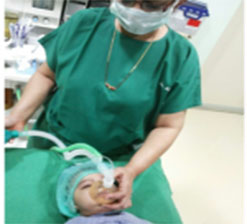A natural concern of any parent or guardian whose child is having an operation is whether the anaesthesia will cause any harm. Anaesthesia is very safe now because of safer medications, better monitoring and good anaesthesia delivery systems. The specific risks of anaesthesia will vary with the type of operation and whether it is an emergency, the age of the child, and any other problems or illnesses that exist
How safe is anaesthesia for my child ?
A natural concern of any parent or guardian whose child is having an operation is whether the anaesthesia will cause any harm. Anaesthesia is very safe now because of safer medications, better monitoring and good anaesthesia delivery systems. The specific risks of anaesthesia will vary with the type of operation and whether it is an emergency, the age of the child, and any other problems or illnesses that exist.
My child is so small. Can he/she be administered anaesthesia ?
Yes, anaesthesia can be administered safely even in new born and premature babies.
Can I stay with my child during the surgery ?
You can accompany your child till transfer bay where anaesthetist can place IV (intravenous) and put your child to sleep if required.
What sort of anaesthetic will my chield receive
In the majority of children, we administer a general anaesthetic, which means that your child will be completely asleep for the surgical procedure. This procedure is completely painless, and will take a few minutes to fall asleep. In some older teenagers, an IV may be placed in order to receive IV medicine to fall asleep. For those younger children that require an IV before they go to sleep, we can often have the nurses put some local anaesthetic cream on your child’s skin, which numbs it a little.
Will my child wake up in the middle of the operation?
No, this is highly unlikely. The anaesthesiologist will stay right with your child at all times, and makes sure that they are fast asleep.
Why is fasting necessary before surgery ?
When patients receive anaesthesia for surgery, they become very relaxed and sleepy. If there is food or liquid in stomach during anaesthetic, it could come up to the back of throat and damage lungs.
How long does my child have to fast before surgery ?
Food and milk empty from the stomach much slower than clear liquids. Frequently used recommended fasting times for different types of food and liquids are as follows
What about fasting before surgery ?
Type of food or liquid Fasting time (hours)
Fatty or fried food 8
Light meal, milk 6
Breast milk (infants) 4
Clear liquids 2
What type of liquids are clear liquids ?
Clear liquids are any type of liquids that, when poured into a clear glass, would allow you to see through them. Some examples are water, electrolyte solution or tender coconut water.
How long will my child take to wake up ?
When the surgery has finished we will stop the anaesthetic medications and allow your child to awaken. This usually takes less than 10 minutes. Your child will then be observed by anaesthetist and nurse for a while and then will be sent to room.
When can my child eat again ?
With a few exceptions (stomach or bowel surgery, for example), your child can eat or drink 2 hours after surgery.
My child has a cold. Should his/her surgery be cancelled ?
An important role of the anaesthesiologist is to ensure that your child breathes freely when asleep for surgery. When a child has a cold, it can result in coughing and spasm of the airways. Although these events, if they occur, are typically mild and easily treated, they can be troublesome
Should my child take his or her medications before surgery ?
Anaesthesiologist will tell you, because some medications should be continued right up to immediately before surgery, and others may be stopped the day of surgery. In general, medications can be taken with a sip of water whenever advised.
What are the risks of anaesthesia ?
Anaesthesia is safer now than it has ever been. Minor complications, including such things as injury to the mouth, sore throat and nausea/vomiting are occasionally seen. The incidence of major complications, including dental injury, major drug reaction, cardiac rhythm disturbances, breathing difficulties and aspiration of stomach contents, is extremely rare, especially in healthy patients. Side effects are nausea, vomiting, drowsiness, dizziness, sore throat, shivering, and discomfort during injection of drugs, and agitation upon awakening from anaesthesia. Adverse effects are very rare, but may occur. These may include dental trauma, allergic reactions to drugs or latex products, wheezing, vocal cord spasm or injury, regurgitation of stomach contents with subsequent aspiration pneumonia, injury to arteries, veins or nerves, alterations in blood pressure, and/or irregular heart rhythms. Death and brain damage are the most feared of all anaesthetic risks, but fortunately these complications are extremely rare.

